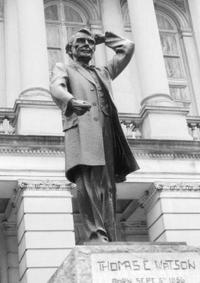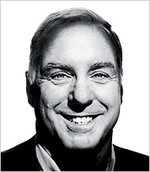The 20th century liberal movement was an amalgam of impulses from populists and progressives. It combined elements of the pro-inflation talk of William J. Bryan with the reformist impulses of Upton Sinclair. It was bawdy street politics taken into the parlor, given a suit, and set on a balcony to change the world through the creative use of government.
Liberalism, in other words, was populism + progressivism.
Now, with the Nixon Thesis collapsing, and with the concept of liberalism discredited among the mass of people (because that was at the heart of the Nixon Thesis), big thinkers like Max Sawicky and Stirling Newberry are back in the salons (virtual ones this time) debating where we go next.
And they are starting with the past.
Sawicky argues that "populism is about the bottom line — ours and not theirs." The original populists were farmers who sought inflation to keep the value of what they produced high. They wanted a bigger piece of the economic pie, enough to live on. And they wanted money defined by production of goods, not just gold.
Newberry rejects the thesis, saying a populist devolves into a reactionary. His example is Thomas E. Watson, who began as an economic populist, then became a U.S. Senator on the wings of racism. (Here he is in front of our state capitol building, about a mile from the tomb of Dr. Martin Luther King Jr.)
Liberalism rejected populism, in the form of George Wallace, when it
rejected racism. The movement of Wallace supporters from Democratic to
Republican (mirroring what blacks had done a generation before, moving
from Republican to Democratic) was the key to the Southern Strategy,
the key to making the present Nixon Thesis dominant.
What have they gotten for it? Plenty. Money is now what they want it to be
— ephemeral, virtual, practically imaginary. The Federal Reserve
does a "bill pass" and there it is, new money. The Congress passes a
budget with trillions in debt and there it is, new money. Every
government around the world can play the game. It’s a populist’s dream.
It’s also a classic pyramid scheme. It’s a macro-economic chain
letter. Only three possibilities are possible, Newberry notes — a
collapse in share prices (all fall down), an export of the game to
other countries (Wal-Mart in China), or new technology that makes everyone’s debts good (a magic pony).
While kids are taught, then, that populism is dead, or that populism
was bigoted, in fact it was co-opted, made part of the Nixon Thesis,
and harnessed to the interests of the wealthy, at the expense of the
middle class who created it.
Liberals today are stuck playing the other cards. Liberals like Howard
Dean talk about balancing budgets, about paying our debts. They are,
from the perspective of a century ago, rock-ribbed Republican (as
Dean’s own family was then. ) The Deans didn’t change. The world changed
around them.
Liberals now rising into power, in other words, must reject economic
populism, an economic experiment which has been tried, and find another
way.
This starts with progressivism, which looks at the reality of
things, and seeks to change that reality, on the margin, in order to
provide the hope needed for the system to continue. As practiced by
both Roosevelts it was a hope, a promise, a dream. That dream came true
after World War II because the rest of the world collapsed,
ushering the American middle class into the world’s upper class.
It didn’t really come true, in other words. And it must, in some form, for the world
to survive this century. Because today the world’s poor are
systematically destroying this planet — cutting its forests for
firewood — just in order to survive into tomorrow. Only a real stake in a real future will change their behavior.
Personally, I think the whole progressive-populist argument is bunk.
We have to find a way to get beyond it. We have to find a consensus
that leads to fundamental change in our attitudes. The crisis which
will force such a change in attitudes is coming. The change must be
managed in the direction of creation, not destruction, or our
grandchildren will have no world — rich, poor or middle class — to
inherit.
That’s where the Open Source Thesis is heading.












